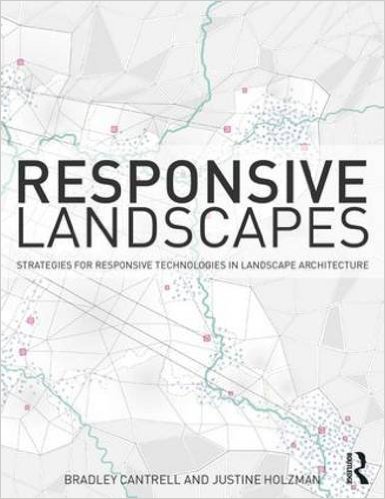February 18, 2016 Holzman’s Book Explores Responsive Technologies
Justine Holzman, adjunct assistant professor in the School of Landscape Architecture, recently published a book, Responsive Landscapes: Strategies for Responsive Technologies in Landscape Architecture, with co-author Bradley Cantrell, an associate professor at the Harvard Graduate School of Design.
Responsive Landscapes frames a comprehensive view of design projects using responsive technologies and their relationship to landscape and environmental space. Divided into six sections, the book frames the projects through the terms: Elucidate, compress, displace, connect, ambient, and modify to present and construct a pragmatic framework to approach the integration of responsive technologies into landscape architecture. Complete with international case studies, the book explores the various approaches taken to utilize responsive technologies in current professional practice.
Holzman joined the UT School of Landscape Architecture in 2015 and is currently teaching landscape architecture design studios,  advanced design communication and contemporary landscape architecture theory.
advanced design communication and contemporary landscape architecture theory.
“This is the first book to rationalize interactive architecture and responsive technologies through the lens of contemporary landscape architectural theory,” said Holzman. “I hope the book will inspire students to question and imagine the role and application of emerging and responsive technologies in landscape architecture, and I believe it will serve as a reference for professionals and academics looking to push the boundaries of landscape projects and seek inspiration for their design proposals.”
Holzman and Cantrell began working on the book while they were teaching at Louisiana State University three years ago. At Harvard, Cantrell is director of the master of Landscape Architecture degree program and design researcher at INVIVIA whose work focuses on the role of computation and media in environmental and ecological design.
In the foreword “Towards a Robotic Ecology,” Nataly Gattegno and Jason Kelly Johnson of Future Cities Lab, state, “Cantrell and Holzman, in the essays and projects collected here, suggest a methodology for the next generation of landscape designer. They call on students, designers, and educators to take ownership of these emerging methodologies and, most importantly, to engage them as design opportunities with mounting social, political, and ecological implications.”
The book is available from the publisher, Routledge, or from other online vendors.
For more information and related work, visit www.responsivelandscapes.com.
The UT School of Landscape Architecture is an interdisciplinary graduate degree program made possible by a partnership between the College of Architecture and Design and the College of Agricultural Sciences and Natural Resources. The school offers an accredited professional Master of Landscape Architecture degree; two non-professional degrees, Master of Arts in Landscape Architecture and Master of Science in Landscape Architecture; and the post-professional Master of Landscape Architecture II degree. For more information on the UT School of Landscape Architecture, visit archdesign.utk.edu/academics/graduate-landscape-architecture/.



